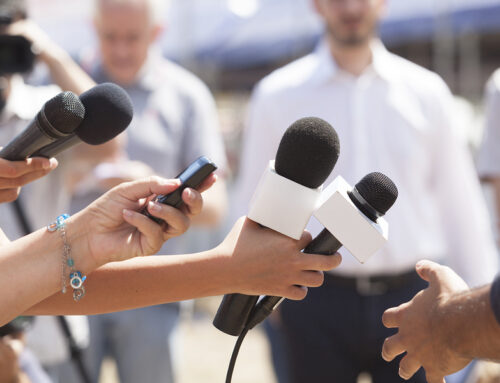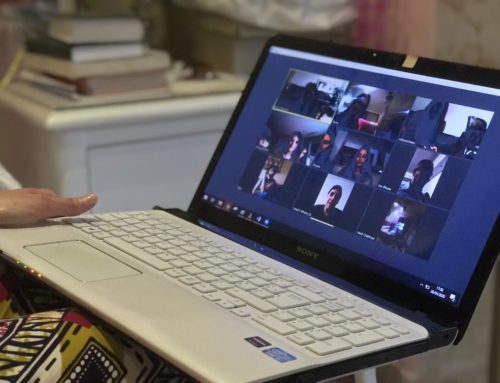Technology is challenging the way people gather for meetings. That’s why online press conferences and media events are a growing trend in the busy news world. They provide a perfect way for nonprofits of all sizes to give the media access to thought leaders, data experts and organizational statements.
Journalists in my research prefer this format because it saves time and the frustration of setting up multiple interviews.
What is an online press conference or media event?
An online press conference or media event allows the organizer to invite a group of attendees to watch a live online video presentation. This could be a conference call or video. The greatest advantage of a web-based press conference is that journalists don’t have to leave their desks to attend, communications people don’t have to schedule multiple interviews and the agency can have more control over the messaging.
I will be sharing more details about the Who, What, When, Where, & How of an online press conference during a budget-friendly webinar on Tuesday, July 9th. We will provide more insight into content, interview styles and inexpensive technology to get you started.
As a journalist, I’ve seen larger nonprofits accomplish this with simple tools but most examples are hidden behind embargoed media-only sites. When I’ve suggested the idea to nonprofits, some have the perception that press conferences and media events are reserved for larger organizations.
Here are a few reasons why online press conferences could work for nonprofits of all sizes…
· You’ve just released a report and you need to coordinate staff interviews with multiple media outlets. Online press conferences will give your staff an opportunity to provide highlights from that report. Note: This is a win for those communications professionals who need to coach and make corrections to messaging.
· You’re having an event and your expert or keynote speaker is busy or reluctant to give interviews. A quick 20-30 minute online interview (conducted by you) will give the journalists the quotes need to write a good story. Free technology such as Go To Meeting or Zoom will even allow you to take a few chat questions. Again, this is the perfect opportunity to help the “expert” drive home your key talking points.
· Breaking news related to your work JUST HAPPENED and multiple media sources want your agency to respond quickly. Creating an online press event (with a written press statement) could be the answer for those who need written quotes and audio. This will allow you to avoid any “Gotcha” questions and carefully script your response to hot topics.
Your event could be as simple as a conference call format or YouTube video. Reporters can typically get what they need for a news story from a quick 5-minute interview, so your online media events should be brief 20-30 minutes to allow for unique samplings. Providing slides, photos, and documents on the call will help save time on the back-and-forth with journalists about minor details.
Here are a few things to consider when getting started:
· Send a media alert. Business Magazine explains the difference between a press release and media alert. Ask the media to register and send reminders through your technology. See examples of how to write a media alert from the United Nations Foundation.
· Have a moderator or interviewer (this could be you). The moderator should have goal-oriented questions that are discussed with the staffer or expert before the event.
· Names and titles of experts, staff, and speakers in the alert and on the call. Add those to your media alert and repeat them before each speaker. Note: If you are working in a conference call format, speakers should identify themselves if you have multiple people chiming in (otherwise attributing quotes could get confusing).
· Be sure you give speakers some “home run” questions in advance. These are questions that you know will advance your agencies goals.
· Let the content live beyond the event on your website, online newsroom, and/or YouTube Channel.
Journalists can register and check in online, so press conference organizers can know who attended and build relations afterward. Offer 3-5 minute follow-up slots for a number of media outlets and provide documents — presenters can use desktop sharing to show documents, graphs, slideshows, and Microsoft PowerPoint presentations.
Web press conferences have their limitations.
Some journalist will want exclusive content. Bloggers and print journalists can get quotes from presenters and ask questions, but there’s no opportunity to take photos. Also TV & radio journalists can’t use online video for their broadcasts if the quality of the video stream is poor.
My advice is to let journalists know that they can ask questions. Consider holding a regular press conference and streaming it online at the same time. Print journalists could grab photos, TV and radio stations could get what they need, and those unable to attend can watch at the appointed time, or watch later on your website or YouTube channel.
Press conferences are changing…
When we talk about online press conference/media events, most people think of formal Press Conferences like the one in this video …
While formal press conferences are nice, they often aren’t necessary, and journalists are moving away from this style of format. While these types of events have their place, journalists are continually moving toward attending less formal and more tech-friendly ways to share your stories.
There are alternatives like this example from The National Council of Nonprofits series of videos related to the importance of the US Census (same YouTube Channel as above but different style). This series of videos provides quality quotes and audio that could be used for radio. Remember quotes provide the exclamation points/opinions for stories.
So save yourself some time by using techniques from this empowered media relations strategy. Holding a successful press conference/media event can be the perfect opportunity to generate a buzz about your cause, event, project, or report.
For more on this trends, register for Trend Alert: Host an Online Press Conference for only $20. This 60-minute webinar will take place at 1:00 p.m. ET (10:00 a.m. PT) on Tuesday, July 9th.






